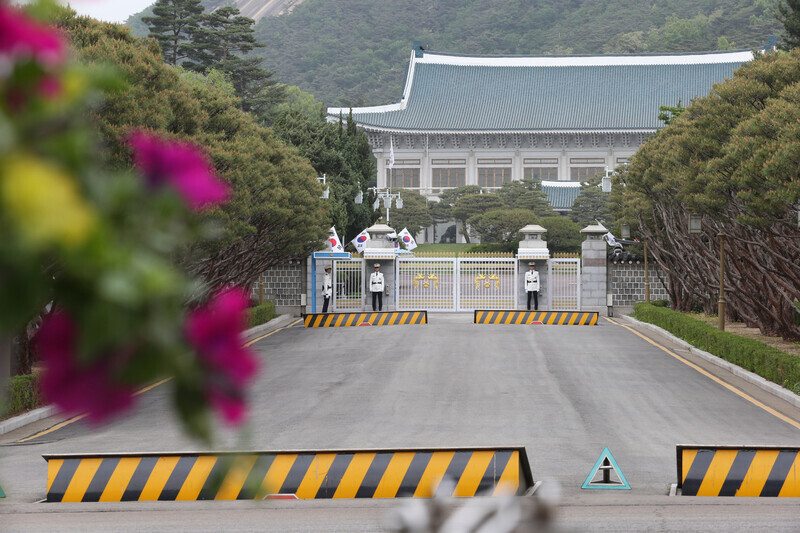hankyoreh
Links to other country sites 다른 나라 사이트 링크
US wiretapping of S. Korean presidential office has been an open secret for 40 years

The fact that US intelligence agencies have been spying on and wiretapping the Blue House in South Korea is an old open secret.
Back in October 1976, the “Koreagate” story broke with an article by the Washington Post. The story came at a time when South Korea and the US were in strong disagreement about the withdrawal of US forces as well as human rights issues taking place in South Korea.
The article alleged that President Park Chung-hee was bribing US lawmakers and government officials with money through lobbyists such as Park Tong-sun. Besides these allegations, the source of the information was just as shocking. It turned out that the US found out about this thanks to the CIA having wiretapped the Blue House.
Soon after, the New York Times published a detailed report about how the Blue House was wiretapped. According to the article, a beamed radio wave was used, a technique that doesn’t require an instrument inside the room targeted for eavesdropping.
“The radio wave is beamed into the room, moved around until it finds an object to vibrate against, and then transmitted back with the voices and noise in the room,” the article explained.
After this incident, Park made sure not to discuss important topics inside the Blue House office to avoid being listened in on and instead had such conversations outdoors in the garden.
A former US ambassador to South Korea confirmed that the Blue House had been wiretapped. When asked if the US government had ever installed a wiretap in the Blue House, William Porter said in an interview with CBS News in April 1978 that “I was told it had stopped before my arrival.”
In 2013, it was also revealed that the US had wiretapped the South Korean Embassy in the US along with 38 other foreign missions. The revelations came at a time when Edward Snowden, a former National Security Agency employee, was leaking a trove of information detailing how the US spies on its own allies.
Again, in 2016, WikiLeaks, a site specializing in exposing classified information, alleged that the NSA had eavesdropped on a conversation between then-UN secretary-general Ban Ki-moon and German Chancellor Angela Merkel back in 2008.
However, unlike other countries that have strongly criticized and demanded explanations whenever a US wiretapping or spying incident is revealed, South Korea has chosen to adopt a much more lax attitude ever since the 1970s, with the government in Seoul always reverting back to its answer that it is busy “verifying the facts.”
By Kwon Hyuk-chul, staff reporter
Please direct questions or comments to [english@hani.co.kr]

Editorial・opinion
![[Column] When ‘fairness’ means hate and violence [Column] When ‘fairness’ means hate and violence](https://flexible.img.hani.co.kr/flexible/normal/500/300/imgdb/original/2024/0516/7417158465908824.jpg) [Column] When ‘fairness’ means hate and violence
[Column] When ‘fairness’ means hate and violence![[Editorial] Yoon must stop abusing authority to shield himself from investigation [Editorial] Yoon must stop abusing authority to shield himself from investigation](https://flexible.img.hani.co.kr/flexible/normal/500/300/imgdb/original/2024/0516/4417158464854198.jpg) [Editorial] Yoon must stop abusing authority to shield himself from investigation
[Editorial] Yoon must stop abusing authority to shield himself from investigation- [Column] US troop withdrawal from Korea could be the Acheson Line all over
- [Column] How to win back readers who’ve turned to YouTube for news
- [Column] Welcome to the president’s pity party
- [Editorial] Korea must respond firmly to Japan’s attempt to usurp Line
- [Editorial] Transfers of prosecutors investigating Korea’s first lady send chilling message
- [Column] Will Seoul’s ties with Moscow really recover on their own?
- [Column] Samsung’s ‘lost decade’ and Lee Jae-yong’s mismatched chopsticks
- [Correspondent’s column] The real reason the US is worried about Chinese ‘overcapacity’
Most viewed articles
- 1China calls US tariffs ‘madness,’ warns of full-on trade conflict
- 2[Column] US troop withdrawal from Korea could be the Acheson Line all over
- 3[Editorial] Yoon must stop abusing authority to shield himself from investigation
- 4[Column] When ‘fairness’ means hate and violence
- 5[Column] How to win back readers who’ve turned to YouTube for news
- 6US has always pulled troops from Korea unilaterally — is Yoon prepared for it to happen again?
- 7[Book review] Who said Asians can’t make some good trouble?
- 8Naver’s union calls for action from government over possible Japanese buyout of Line
- 9Could Korea’s Naver lose control of Line to Japan?
- 10[Editorial] Korea must respond firmly to Japan’s attempt to usurp Line